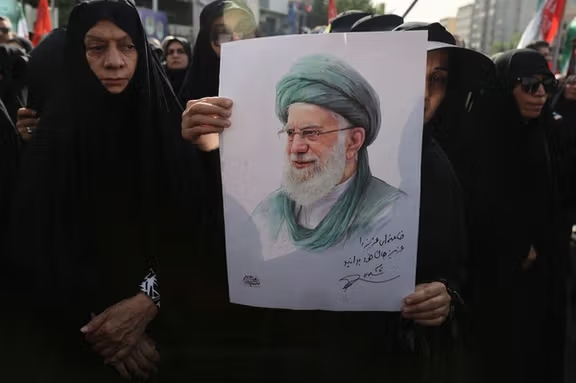“I think here's where they should discuss the terms of, in effect, the surrender of the Ayatollahs,” Bolton said, calling for sustained pressure to build on military successes in a 12-day Israel-Iran war to pave the way for the collapse of Iran's theocracy.
Trump is due to receive Netanyahu on Monday in their first meeting since US and Israeli strikes targeted Iran’s nuclear facilities, missile infrastructure and command centers, killing as many up to 1,200 Iranians. 24 Israelis were killed in Iranian attacks.
Netanyahu has said he will also meet Secretary of State Marco Rubio, Defense Secretary Pete Hegseth, Commerce Secretary Howard Lutnick, and Trump’s Middle East envoy Steve Witkoff.
A weakened Islamic Republic
Bolton argued that the strikes which crippled key military sites and killed senior commanders of Iran’s Islamic Revolutionary Guard Corps (IRGC), have pushed the Islamic Republic's leadership to the brink.
“The aerial strikes are really a substantial destabilizing factor,” he said. “They demonstrate beyond a doubt the Ayatollahs are no longer able to defend their own country. They can be pushed about at will.”
The Islamic Republic, Bolton argued, is at its most vulnerable point since the 1979 revolution, weakened not just militarily but also internally, citing longstanding discontent, particularly among youth, women, and ethnic minorities.
“We're within sight of it, which is why it would be such a tragedy to let up now and let it slip between our fingers,” said Bolton.
There have been few significant protests during or after the conflict.
Ceasefire 'mistake'
Although Bolton praised the initial decision to strike Iran’s nuclear program, he criticized the subsequent US-brokered ceasefire as “a mistake.”
“Our military knows that you don't know exactly how much damage has been done in the first hours after an attack,” he said. “We were in complete control of the skies ... (and) that gave us time ... to decide where additional attacks might be necessary.”
Instead, Bolton said the ceasefire gave Iran breathing room at a critical moment. He attributes that decision, in part, to Trump’s desire to appear as a global dealmaker.
“Trump wants a Nobel Peace Prize and I think he believes that after a very successful US military strike that he could broker it,” said Bolton. “It's always in personal terms for Trump. It's not about American national security interests or Israel or Iran, it's about what makes him look best.”
The president and Bolton spectacularly fell out in public and Trump has repeatedly insulted his ex-subordinate and pulled his government security detail.
Bolton accused the administration of prioritizing loyalty and optics over expertise, pointing to Trump’s appointment of real estate developer Steve Witkoff as Iran envoy.
“Trump's negotiator, Steve Witkoff… has no concept what he's dealing with when he negotiates with the Ayatollahs, no knowledge of nuclear weapons or the risk of nuclear proliferation,” said Bolton.
Critics have raised concerns about 900 pounds of uranium enriched to 60 percent that remains unaccounted for. Bolton said strikes on Esfahan and other sites likely destroyed key elements required to turn that material into a weapon.
“They may have a lot of partially enriched uranium hexafluoride gas,” he said, “but it's a long way to go from that to actually making a nuclear weapon.”








